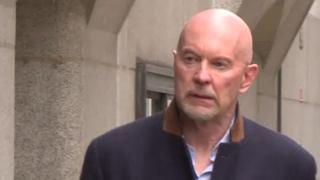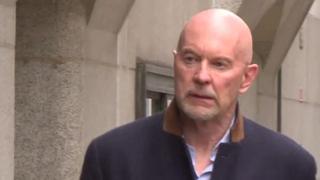Barclays made ‘dodgy’ deal with Qatar, court hears
Two Barclays executives dishonestly hid a payment to Qatari investors, prosecutors allege. …


Senior Barclays executives warned each other it was “dodgy” to pay the Prime Minister of Qatar millions for “advisory services”, a court has heard.
They raised concerns with lawyers and discussed the risk of jail if they were blamed for the arrangement.
But audio recordings played to the court revealed they expected responsibility to lie with the chief executive and board of directors.
Roger Jenkins, Tom Kalaris and Richard Boath are on trial at the Old Bailey.
They are accused of fraud and conspiracy to commit fraud.
- Ex-Barclays executives face fraud trial over Qatar rescue
- Top Barclays executives ‘hid £280m payment’, court hears
On Friday the court heard phone calls from June 2008, when Barclays was seeking billions of pounds in extra capital to boost its weak finances.
The then Prime Minister of Qatar, Sheikh Hamad al-Thani, indicated to Roger Jenkins he was prepared to invest £2bn.
But the Qatari investors wanted a commission for doing so of 3.25% – more than double the 1.5% commission other investors were getting.
Rather than paying all investors the same, higher amount, the court heard, Barclays arranged to pay the Qatari investors an “additional fee” of 1.75% – or £35m – for ‘advisory services’.
Roger Jenkins negotiated the deal in close consultation with Bob Diamond, then deputy chief executive, according to transcripts of phone calls read out in court.
“I was on and off the phone with Bob and on and off the phone with Hamad and we eventually agreed,” Mr Jenkins was quoted telling Mr Boath in 2008. “The night of 11 June, I had a conversation with Sheikh Hamad, exploring the advisory agreement.”
The Serious Fraud Office’s case is that the advisory services agreement was fraudulent because it was in fact simply a mechanism to pay the Qataris’ additional fees.
‘A bit tricky’
Mr Kalaris told Mr Boath the scheme had been approved by then-deputy chief executive Bob Diamond and finance director Chris Lucas, and also by compliance director Steve Morse.
Only after the deal was struck did they realise that it might be wrong to retain the Prime Minister of Qatar as an adviser to Barclays.
Mr Boath and Mr Jenkins told Sheikh Hamad he had to disclose his beneficial ownership of the vehicles used to invest the money.
“He is the prime minister,” Mr Boath told Mr Jenkins in a phone call on 18 June 2008. “So him getting paid to provide us with advisory services is a bit tricky”.
“Actually that’s true,” Mr Jenkins replied. “I don’t know what to do with this… But he wants his money”.
Richard Boath suggested a legitimate solution:
“You know what I want to do? You know what I think the best thing to do is… we basically start again… the Chinese come in, everybody comes in, we disclose 3% fees…. none of us is going to jail and we get a deal done on Tuesday.”
Jenkins: “Fine, but let’s deal with the real… what we’ve got.”
In court, Ed Brown QC, prosecuting, said: “You may well think he was beginning to say ‘reality’. You may wish to take that recording into account carefully – it is revealing”.
Later in the same call, Mr Jenkins returned to the same point:
“…given his position of Prime Minister and Foreign Minister -“
Richard Boath: “It’s a bit dodgy.”
Roger Jenkins: “It’s a bit dodgy. You can’t as a Prime Minister, take these services…”
Following the call with Mr Jenkins, Richard Boath spoke to Barclays lawyers Judith Shepherd and Matthew Dobson who advised him the Qataris had to provide “valuable services” in exchange for the Barclays’ money.
Matthew Dobson: “And it’s actually beyond Roger, it’s the board actually, because you know this is all part of the –
Richard Boath: “Are we going to have to demonstrate over time that they have provided these services?”
Judith Shepherd: “If anybody challenges us.”
Mr Boath: “Like any, any of the other investors?”
Ms Shepherd: “Any of the other investors, the FSA, the UKLA, the criminal authority, the Fraud Unit.”
Mr Boath: “I’m already feeling sick. There’s no need to use all those words to make me feel sicker.”
Ms Shepherd: “Well, I haven’t even finished my list yet.”
Mr Boath: “Right…”
Ms Shepherd: “It’s serious stuff; we’re not playing a game here.”
Mr Boath: “No… well if it were me I wouldn’t have agreed to it. But there you go… So, all right.”
Ms Shepherd: “Well Big Dog [Roger Jenkins] will be in the dock first.”
Mr Boath: “Otherwise known as the ‘Dodger’ so maybe he might even dodge that one… By the way, are the board going to see this agreement?”
Ms Shepherd: “Of course they are.”
Mr Dobson: “It’s their necks on the block.”
The trial continues.



